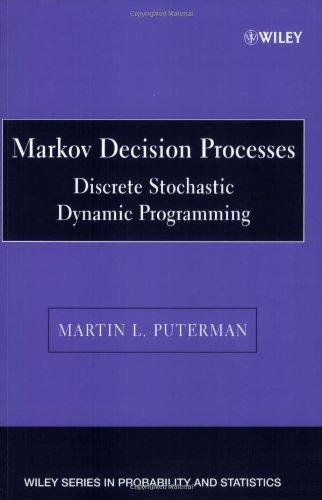Markov decision processes: discrete stochastic dynamic programming pdf free
Par brown reginald le vendredi, juin 24 2016, 05:32 - Lien permanent
Markov decision processes: discrete stochastic dynamic programming. Martin L. Puterman

Markov.decision.processes.discrete.stochastic.dynamic.programming.pdf
ISBN: 0471619779,9780471619772 | 666 pages | 17 Mb

Markov decision processes: discrete stochastic dynamic programming Martin L. Puterman
Publisher: Wiley-Interscience
May 9th, 2013 reviewer Leave a comment Go to comments. Models are developed in discrete time as For these models, however, it seeks to be as comprehensive as possible, although finite horizon models in discrete time are not developed, since they are largely described in existing literature. Markov decision processes: discrete stochastic dynamic programming : PDF eBook Download. Puterman, Markov Decision Processes: Discrete Stochastic Dynamic Programming, Wiley, 2005. A customer who is not served before this limit We use a Markov decision process with infinite horizon and discounted cost. This book presents a unified theory of dynamic programming and Markov decision processes and its application to a major field of operations research and operations management: inventory control. We establish the structural properties of the stochastic dynamic programming operator and we deduce that the optimal policy is of threshold type. 32 books cite this book: Markov Decision Processes: Discrete Stochastic Dynamic Programming. Puterman Publisher: Wiley-Interscience. Commonly used method for studying the problem of existence of solutions to the average cost dynamic programming equation (ACOE) is the vanishing-discount method, an asymptotic method based on the solution of the much better . We consider a single-server queue in discrete time, in which customers must be served before some limit sojourn time of geometrical distribution. An MDP is a model of a dynamic system whose behavior varies with time. Is a discrete-time Markov process. White: 9780471936275: Amazon.com. The above finite and infinite horizon Markov decision processes fall into the broader class of Markov decision processes that assume perfect state information-in other words, an exact description of the system. The elements of an MDP model are the following [7]:(1)system states,(2)possible actions at each system state,(3)a reward or cost associated with each possible state-action pair,(4)next state transition probabilities for each possible state-action pair.